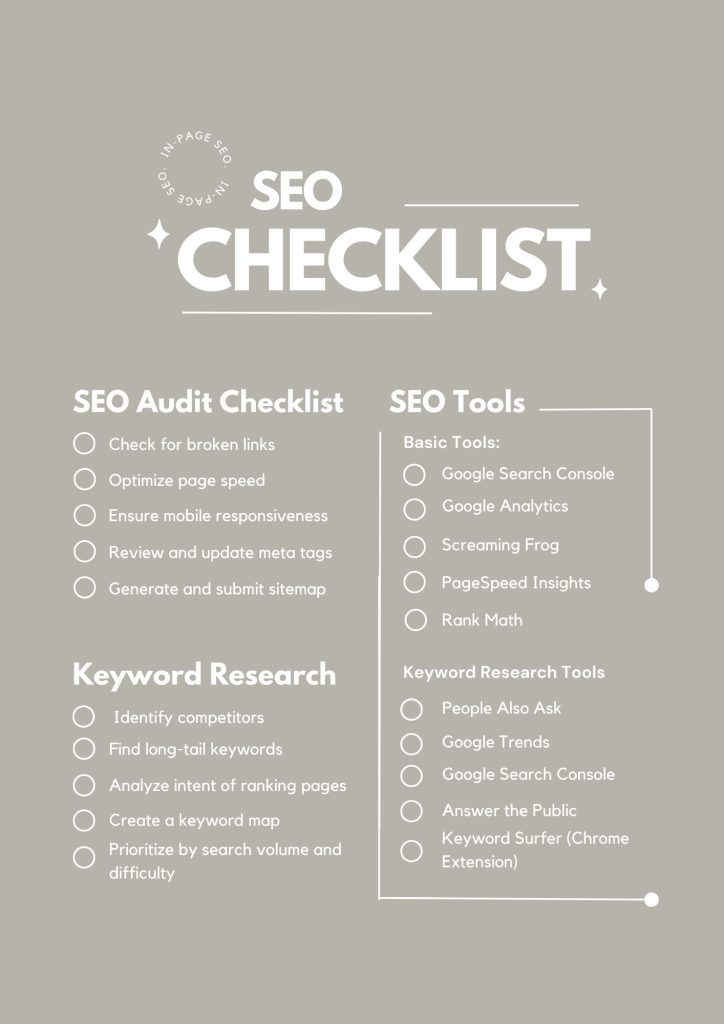
Introduction
Running a small business means wearing many hats, and managing your online presence can often take a backseat. But with the right tools and strategies, a DIY SEO campaign can help you boost your search rankings, drive more traffic to your website, and ultimately grow your business—all on your own. In this guide, we’ll walk you through the essential steps to run a successful DIY SEO campaign, even if you’re just starting out. Whether you’re looking to rank higher on Google or simply increase your online visibility, these tips will help set you on the right path.
Need some extra help along the way? At In-Page SEO, we specialize in helping small businesses like yours build effective SEO strategies that drive results. Book a consultation today and let us guide you to SEO success!
Table of Content
Table of Contents
Key Takeaways
- Start with clear goals and objectives for your SEO campaign.
- Use comprehensive keyword research and tools like Semrush to find the right keywords.
- Conduct regular SEO audits to fix issues that could impact your rankings.
- Build quality backlinks and produce valuable content that resonates with your audience.
- Track your progress with tools like Google Analytics and adjust your strategy as needed.
Set Clear Objectives
Before diving into SEO, it’s essential to define specific goals. Are you aiming to increase organic traffic, improve search rankings, or enhance conversions? Setting clear objectives will guide your SEO efforts and help you measure the effectiveness of your strategies. Having well-defined goals makes your efforts more focused and impactful.
Conduct Comprehensive Keyword Research

Keyword research is the backbone of any successful SEO effort. Start by brainstorming words and phrases your ideal customers might type into a search engine when looking for products or services like yours. Think about specific questions they might ask or problems they’re trying to solve.
To refine your list, try searching these phrases yourself and note the suggestions that appear in search engine autocomplete or the related searches at the bottom of the results page. Focus on longer, more specific phrases (called long-tail keywords) that match your audience’s intent—these often attract people who are ready to take action or make a decision.
Perform an SEO Audit
A successful DIY SEO campaign starts with an audit of your website. Check for issues like broken links, slow page load speeds, and mobile responsiveness. Use free tools like Google Search Console or paid tools like Ahrefs to identify on-site problems that might be hindering your rankings. Regular SEO audits ensure your website remains optimized for both users and search engines.
Analyze Competitors
Understanding what your competitors are doing well can provide valuable insights. Study their content strategies, backlink profiles, and the keywords they’re ranking for. Identify any gaps or areas where you can improve. This analysis will help you fine-tune your approach and give you a competitive edge.
Optimize On-Page Elements
On-page SEO refers to the content and structure of your website. Start by optimizing title tags, meta descriptions, header tags, and images. Ensure each page is targeted toward a specific keyword and provides valuable, well-structured content. Proper on-page optimization helps search engines understand your pages better and improves user experience.
Develop High-Quality Content
Content is king in SEO. Develop high-quality, informative content that answers the questions your target audience is asking. Blog posts, how-to guides, and case studies are all effective ways to provide value. When you publish content consistently, you not only improve your search engine rankings but also build trust with your audience.
Build Quality Backlinks
Backlinks from reputable websites signal to search engines that your site is trustworthy. Focus on acquiring high-quality backlinks through guest blogging, partnerships, or content promotions. A strong backlink profile improves your site’s domain authority and boosts its rankings in search results.
Monitor and Adjust Your Strategy
Once you launch your SEO campaign, it’s important to track your progress. Use tools like Google Analytics to monitor traffic, bounce rates, and conversion rates. Regularly review these metrics to determine which strategies are working and where improvements are needed. SEO is not a one-time effort—it requires ongoing optimization.
Leverage Local SEO
If your business caters to a specific geographic area, local SEO is a must. Claim your Google My Business listing and optimize it with accurate, up-to-date information. Encourage customer reviews and ensure that your NAP (Name, Address, Phone Number) is consistent across online directories. Local SEO helps you reach customers in your community and increases your visibility in local search results.
Stay Informed and Adapt
SEO is a constantly evolving field, with search engine algorithms frequently changing. To stay competitive, it’s essential to stay informed about SEO trends and best practices. Follow trusted sources like Google’s Webmaster Blog or Moz to ensure your SEO strategies remain effective. Adapting to changes in the SEO landscape will help you stay ahead of the competition.
FAQs
Is SEO worth it for small businesses?
Absolutely! SEO is one of the most cost-effective ways to drive organic traffic and increase visibility for your small business. A successful SEO campaign helps you attract more customers, increase conversions, and ultimately grow your business.
How much should I pay someone for SEO?
The cost of hiring an SEO professional can vary greatly depending on their experience and the scope of your project. Small businesses typically spend anywhere from $500 to $5,000 per month on SEO services. However, doing SEO yourself is often more affordable and can be just as effective with the right approach.
How much does SEO cost for a small business in Canada?
SEO costs for small businesses in Canada range between $1,000 to $4,000 per month. The price depends on the level of competition in your industry and the services you require. DIY SEO can be a cost-effective option if you have the time and knowledge.
How much does it cost to hire someone for SEO?
The cost of hiring an SEO expert can range from $50 to $300 per hour, depending on their experience and expertise. For a monthly retainer, small businesses can expect to pay anywhere from $1,000 to $10,000, depending on the complexity of the project.
Book Your Consultation
Running a DIY SEO campaign can seem daunting, but with the right strategy and tools, it’s entirely achievable. If you need assistance in setting up or refining your SEO efforts, consider booking a consultation with us at In-Page SEO. We can help guide your small business to success online.



